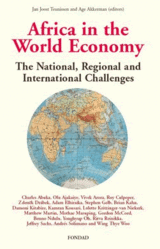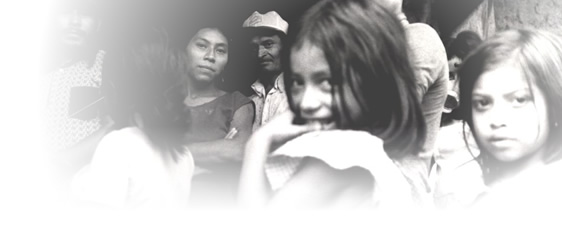Africa in the World Economy: The National, Regional and International Challenges
|
Contributing authors:
Charles Abuka,
Olu Ajakaiye,
Vivek Arora,
Roy Culpeper,
Zdeněk Drábek,
Adam Elhiraika,
Stephen Gelb,
Brian Kahn,
Damoni Kitabire,
Kamran Kousari,
Lolette Kritzinger-van Niekerk,
Matthew Martin,
Mothae Maruping,
Gordon McCord,
Benno Ndulu,
Yonghyup Oh,
Ritva Reinikka,
Jeffrey Sachs,
Andrés Solimano,
Jan Joost Teunissen,
Wing Thye Woo
Editors: Jan Joost Teunissen and Age Akkerman Summary
A book that examines the economic constraints to growth and development in sub- Saharan Africa, the international community’s responsibilities, and the development model that would best fit African realities.
Contributing authors include African experts and a wide range of international policymakers and thinkers. They provide insights of great relevance to the development prospects of African and other poor countries. The contributors to this book examine the economic constraints to growth and development faced by sub-Saharan African countries. These constraints include the underdevelopment of domestic capital markets, the lack of national and regional infrastructures, and the ongoing dependence on the export of commodities whose prices and markets are volatile and remain largely determined by the large companies of western countries. At the same time, the book discusses the international community’s responsibility to remove obstacles of its own making and create the necessary international conditions that would enable Africa to overcome its development and poverty problems. The book includes an interesting discussion about the development model – the role of the state and the role of the market – that would best fit African realities, and the lessons that can be learned from experiences in Latin America and Asia. It also includes a timely analysis of the developmental role of emerging Asian investments into Africa. The issues discussed in this book are of great relevance to the development prospects, not only of the African region, but of poor countries in general. Quotes
“Many parts of Africa are well governed, and yet remain trapped in poverty. Governance is a problem, but Africa’s development challenges are much deeper… More policy or governance reform, by itself, is not sufficient to overcome this trap. The fallacies of the Washington Consensus certainly apply to the African case.” Wing Thye Woo , University of California, Jeffrey D. Sachs, Columbia University and Gordon McCord, Columbia University “The Millennium Development Goals are a declaration of enhanced intervention in the aid programme to Africa. ...This combination of enhanced intervention, more money and a top-down approach has the danger of depriving recipients of the spirit of independence.” Yonghyup Oh, Korea Institute for International Economic Policy “Current aid practices result in insufficient aid for public investment to grow and reach the Millennium Development Goals… Aid is of poor quality and low effectiveness, and the global aid architecture is thoroughly inadequate.” Matthew Martin, Debt Relief International “The role of the state in financial sector development in sub-Saharan Africa should go beyond regulation and surveillance of the banking sector to the establishment and deepening of the capital market...” Olu Ajakaiye, African Economic Research Consortium “It is likely that many African countries are simply too small to develop viable and deep enough markets to attract foreign interest even with the appropriate macroeconomic policies and institutions… moving towards a regional bond markets would help overcome the diversification problem and strengthens the argument for regional capital markets in Africa.” Brian Kahn, South African Reserve Bank “International trade policy and policy advice by institutions like the World Bank vis-à-vis Africa need a fundamental overhaul… Growth-oriented strategies would require much greater policy space in order for African countries to devise strategic trade and industrial policies adapted to their specific economic and social conditions and based on their endowments.” Kamran Kousari, UNCTAD “The policy advice given to developing countries today is completely at odds with the East Asian experience... Pressing the South to open its markets to agricultural imports completely neglects the adverse impact those kinds of liberalisation policies in the South will have on the rural poor and in the agricultural sector.” Roy Culpeper, North-South Institute Contents
Contents, Abbreviations & Notes on Contributors
Capítulo 1 en Español (Spanish version of Chapter 1)
1 Clichés, Realities and Policy Challenges of Africa: By Way of Introduction Jan Joost Teunissen
Part I: The Development Paradigm For Africa Gordon McCord, Jeffrey D. Sachs and Wing Thye Woo 3 The Challenge of African Development: A View from Latin America Andrés Solimano 4 Are the MDGs Helping Africa to Become Independent? Yonghyup Oh 5 Development Beyond the Millennium Development Goals Roy Culpeper
Part II: The National and Regional Challenges for Africa 6 Original Sin and Bond Market Development in Sub-Saharan Africa Brian Kahn 7 Role of the State in Financial Sector Development in Sub-Saharan Africa Olu Ajakaiye 8 Capital Market Development in Uganda Damoni Kitabire 9 Infrastructure, Regional Integration and Growth in Sub-Saharan Africa Benno Ndulu, Lolette Kritzinger-van Niekerk and Ritva Reinikka 10 Infrastructure, Regional Integration and Growth in Africa Charles Abuka Mothae Maruping 12 Is Sub-Saharan Africa an Optimal Currency Area?Zdenĕk Drábek
Part III: The International Challenges: Trade and Finance 13 The International Challenges: Trade and Finance Africa’s Development and External Constraints Kamran Kousari 14 Keeping Africa’s Policies on the Right Track Vivek Arora 15 An Integrated Approach to Africa’s Development ConstraintsAdam Elhiraika 16 South-South Investment: The Case of Africa Stephen Gelb 17 Africa’s External Constraints: What Developed Countries Should Do Matthew Martin |
 € 17,50
Order now
December 2005 |










 Download Book as PDF
Download Book as PDF